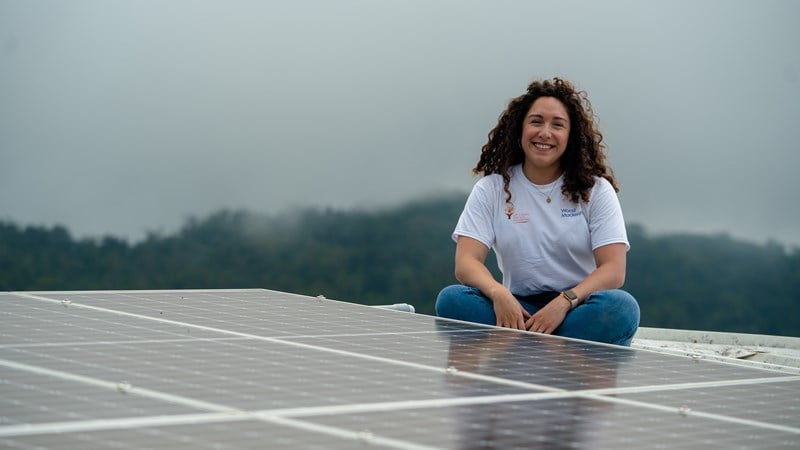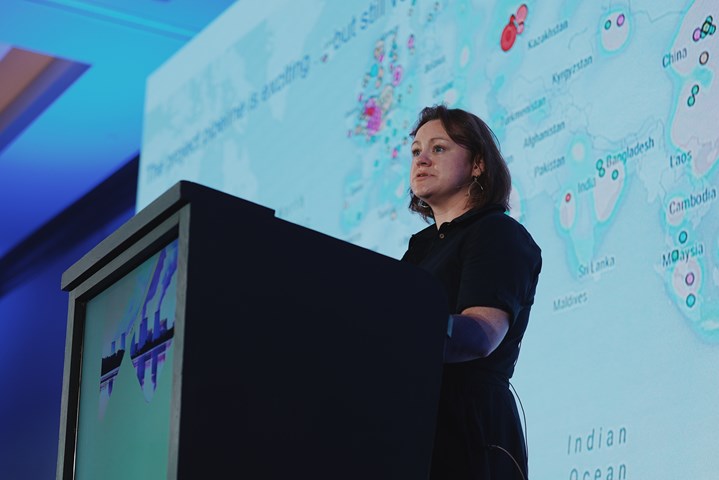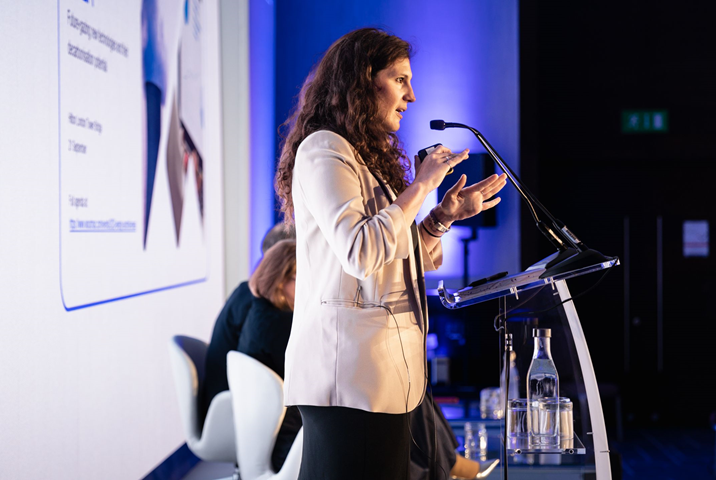Sign up today to get the best of our expert insight in your inbox.
Why women are at the heart of a successful energy transition
Women have a central role to play as agents of change in the energy transition – so how do we best harness their experience, skills and talent?
6 minute read
Climate change has a disproportionate impact on women and girls. A threat multiplier, the climate crisis escalates socio-economic tensions, widens poverty gaps and amplifies gender inequality. Conversely, energy security can be a lifeline for victims of domestic violence, for instance. It’s one of the reasons that we partner with Let’s Share the Sun to support energy access for a women’s shelter in Puerto Rico, helping to bring a greater sense of safety and security to its residents.
It's imperative that women are truly empowered as stakeholders, policy-makers and implementors of a just energy transition. In a traditionally male-dominated space there’s work to be done – but the opportunity is vast. COP28 reaffirmed the commitment to a gender-responsive just transition, not only as a human rights issue but because achieving gender equality and women’s empowerment “accelerates the implementation of the Paris Agreement.” And as our own energy transition outlook (ETO) shows, an acceleration is needed to get onto a 1.5 °C pathway.
So, why is the role of women so pivotal? And how do we better harness their experience, skills and knowledge? Some of the talented women of WoodMac share their view.
With thanks to Elena Belletti, Mhairidh Evans, Prachi Mehta, Juliana Teixeira, Isha Chaudhary, Sylvia Leyva Martinez, Valentina Kretzschmar, Ixchel Castro and Xiaoyang Li.
How important is the role of women as drivers of change in the energy transition?
Sylvia: Women often bear disproportionate impacts of climate change due to their vulnerable socio-economic status, particularly in developing regions. By empowering women in energy, we amplify collective efforts to combat climate change. Some efforts to integrate gender equality into discussions and actions have been gaining momentum, including at events like COP. But there’s a long way to go.
Sylvia Leyva Martinez, Principal Analyst, North America Utility-Scale Solar, pictured in Puerto Rico as one of the WoodMac volunteers working to improve energy security in a rural mountain town.
Valentina: Research has shown that women have more positive attitudes towards climate action. Therefore, having more women in leadership positions, as well as more gender-balanced boards, would accelerate the transition towards a low-carbon future.
Isha: Sustainability and gender parity are interlinked and must move in sync. Energy transition requires fresh perspectives – a larger role for women will ensure that innovative solutions are effectively implemented.
Xiaoyang: Gender equality is not ‘merely’ a moral issue but a prerequisite for effective climate action. I find, as corporate leaders or STEM professionals, women tend to prioritise innovation and address long-term challenges. Since energy transition takes time and creativity, their role is crucial.
Are there enough women ‘in the room’?
Mhairidh: There are more than when I started my career nearly 20 years ago. It’s rare to find myself the only woman in a meeting. Yet, look around conference panels and boardrooms and it’s clear that there are still stark gaps in the senior levels of the energy industry.
Mhairidh Evans, Head of CCUS Research, speaking at the Wood Mackenzie CCUS Conference
Prachi: At a recent energy conference I suddenly realised that I was the only female speaker – and the only non-white speaker. That realisation added more gravity to my role and the impact I can have. Representation matters.
Elena: The main barrier is the bias generated by not seeing enough women in the room. We need more women at the top of this industry, in a variety of roles – and not just tokens of diversity – and more women at all levels, with concrete opportunities for advancement.
Mhairidh: One of the main issues is structural. Senior roles are naturally fewer in number and leadership opportunities rarely arise organically. This ‘funnel’ creates a challenge for all emerging leaders, but especially women whose barriers to entry are generally still higher than their male counterparts.
How can we increase female representation in corporate leadership?
Valentina: This industry is still very male-dominated, and the challenge is deep and structural. By the time girls are offered STEM subjects it‘s already too late. Girls need to be attracted to science and engineering from pre-school age. Later, mentorships play a very important role in allowing young women to learn from senior leaders, emboldening them to identify and take leadership opportunities.
Mhairidh: For me, increasing representation starts with allyship and role models. The sisterhood is a powerful force – but male allies matter. Employee working groups are most effective when comprised of willing participants of diverse genders, backgrounds and career stages. We can start early in recruiting allies too – a personal objective is for my sons to enter the workforce as feminists!
Juliana: Role models are so important. Women can see and feel that it’s a space they can occupy. If we add layers of diversity, such as different ethnicities and backgrounds, having examples to relate to is even more important.
Elena: It must be recognised that greater inclusion is everyone's job – not just women's. We must hold everyone to high standards of accountability, in making sure that there is diversity in top roles and in having zero tolerance for discrimination.
Role models are so important. Women can see and feel that it’s a space they can occupy.

Juliana Teixeira
Latin America Upstream Senior Research Manager
Juliana helps lead our coverage of Brazil's offshore upstream construction, operations and costs.
View Juliana Teixeira's full profileSylvia: Robust inclusion, diversity and belonging policies are key. And information is power! Having a system to measure and communicate gender metrics (pay gap, promotions rate, number of women in leadership, etc) is fundamental.
Ixchel: Organisations must create the conditions for people to develop equally, along the journey. For me, supporting women as they reach middle management is crucial to developing talent, and a healthy pool for future senior leadership.
Isha: As an industry we must step up efforts to both recruit and retain talent, and avoid losing women at their mid-career stage when they take breaks for childcare or families. Initiatives that support women back into work, with flexibility around hours, are vital.
Prachi: The ‘whole journey’ aspect really is vital. We must inspire young girls through school programmes and site visits. Actively recruit them from undergrad into STEM roles – and create maternity and return to work programmes so they can confidently start a family and have a thriving career.
Xiaoyang: Traditional social norms have not completely disappeared from the lives of modern women. But it’s encouraging that more and more women are receiving higher education, becoming corporate leaders and making outstanding contributions in STEM fields.
I’m delighted to see younger women, especially in the renewable energy sector, moving towards a new era characterised by greater professionalism, responsibility and leadership.
Elena Belletti, Global Head of Carbon Research, speaking at the Wood Mackenzie Energy & Natural Resources Summit
What’s your top tip for women looking to build a career in this field?
Valentina: Accept that it will be a bumpy road and there will be setbacks. But each setback is a valuable lesson, just keep moving forward. Don’t be afraid to accept challenges and opportunities because you feel you’re lacking experience. Be brave – you’ll learn quickly.
Mhairidh: I see too often that women – and other minority groups – adjust their actions or ambitions to fit social or organisational norms. If I could go back in time, I’d remind my younger self: “take up your own space”. Have the courage to use ‘I’ where it’s deserved, rather than ‘we’. Ask for that presentation opportunity, that training, that pay rise and ask with confidence.
Juliana: Ally with other women and give amazing feedback. The more we support each other, the stronger we get. At the same time, find male allies who are truly willing to support and speak up for women.
I’m delighted to see younger women, especially in the renewable energy sector, moving towards a new era characterised by greater professionalism, responsibility and leadership.

Xiaoyang Li
Director, China Renewables Research
Xiaoyang focuses on analysis of China’s renewables power market
Latest articles by Xiaoyang
-
Opinion
China’s solar & storage exports achieve record growth with more than 40% surge
-
Opinion
Expansion opportunities beckon for China’s wind companies
-
Opinion
Wind power to play a key role in achieving China's carbon neutral goal
Ixchel: Bring less experienced colleagues on the journey with you. Share learnings, provide feedback in private and encouragement and praise in public. You’ll find yourself recharged in your own journey as you see others grow.
Sylvia: Network, network, network! Attend conferences and industry events. If there are no local groups, create one. Some great groups are Women and Climate, WRISE and Ally Energy. And don’t be afraid to advocate for yourself. Leverage social media to develop your personal brand and dare to share your industry views with the world. Speak up – and listen!










